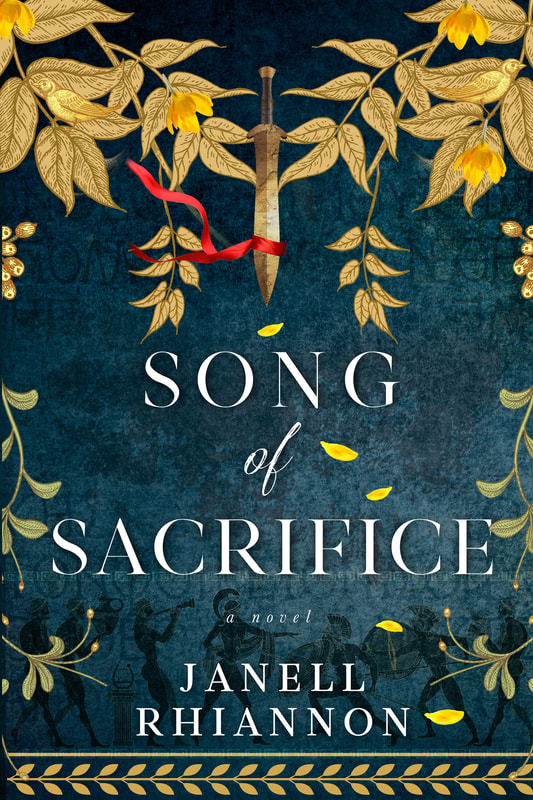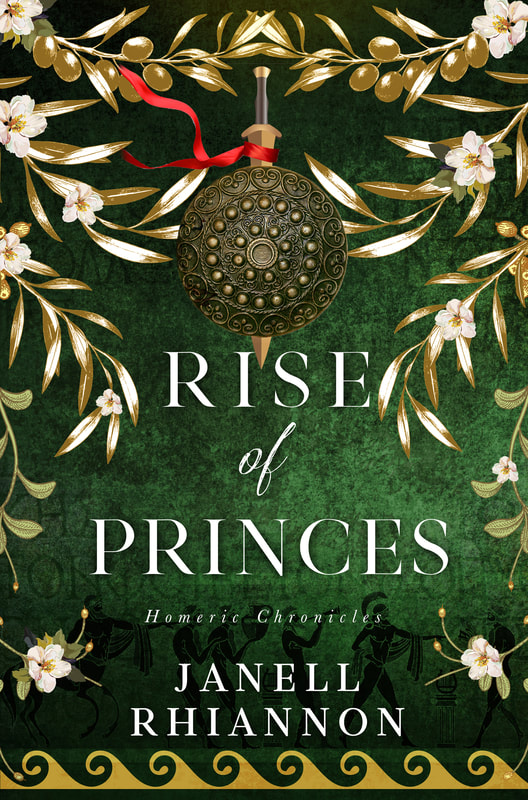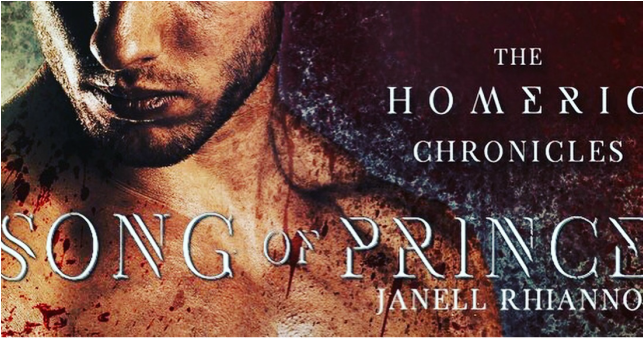Wonder Women of Greek Myth: Hecuba and Leda Of all the queens in Troy and Greece, Hecuba and Leda hold a special place in my heart. They are the mortal matriarchs of the Trojan War epic. And they deserve their fair share of the limelight along with the likes of Helen, Clytemnestra, Andromache, and even Briseis. I wanted to talk about them side by side, because they share similar qualities as matriarchs of their prestigious families. We can glean quite a bit about our heroes and a mother’s love through their respective narratives. Hecuba and Leda are complex women, having suffered at the hands of the gods and their husbands. They fiercely love their children, almost to a fault. They’re complex and wise, powerful and tender, and uncompromising in their quest to establish control in their worlds. I’d like to take a wee side road about portraying the feminine role in ancient Greek mythology. I’ve been recently reading a paper by Emily Hauser, PhD and author of the Golden Apple Trilogy, about the ancient women’s voices echoed in modern fiction, and how it’s in the minimal space they’re afforded in the text that gives us the latitude to explore who they were, contemplating their motivations, goals, and achievements in their own right. (Emily Hauser’s paper “There is another story: Writing after the Odyssey in Margaret Atwood’s The Penelopiad” is available at her Academia.edu account.) It got me thinking about how privileged I feel to be writing about all the lovely female characters, which for the most part, hold pivotal positions in the most powerful stories, yet are relegated to being foils or temptations for the male characters, or the objects of illicit desires and subjects of kidnapping and rapes. So, let their voices RISE in modern song. QUEEN HECUBA is barely mentioned by Homer, yet she undoubtedly played a key parental role in raising Hektor, the greatest defender of Troy. In the tension between Hektor and Achilles, we see a mother’s deep devotion and agony as she’s helpless to keep her grown son safe from the notorious killer, Achilles. For a mother, there’s no such thing as forgetting that your child was once young. You carry them, suckle them, and in return they drank in your presence. Even as a grown man stands before you, rugged and bearded, shoulders wide enough to crush a bull—you can still see the little boy beneath the layers of years. Surely, Hecuba had that kind of bond with her son, Hektor. How might this relationship have evolved? How might she have influenced her son’s maturity and prince hood; his priorities, loyalties, and sense of responsibilities? And most importantly, by looking at Hektor’s story what can we hear Hecuba saying? We have to go back to the beginning. Hecuba was Priam’s second wife, who became the primary wife and mother to almost 2 dozen royal children. Hektor was likely the first child they had together, as well as the first son with Paris being the second son. Because Hektor was the first born, he probably remembered the baby Paris, who disappeared. Perhaps he knew exactly what happened, maybe not. It doesn’t really matter, only that he was there to witness the effects on his mother. He certainly would’ve remembered his mother’s grief and sadness, because prophesy or not a mother doesn’t forget a child she loses for whatever reason. Because Hecuba’s voice is silenced in the myth, we’ve freedom to explore what she felt by looking at her son’s marriage and her desperate efforts in the Iliad to persuade Hektor not to fight Achilles. I think Homer (whoever he/she was) understood the implied complexity of Hecuba and Hektor’s relationship on some level. Their marriages are mirrors of each other, and becasue of that we can see and hear a Hecuba more clearly. There’s the implication that Hektor knew the pain his mother carried after the baby was stripped from her arms and afterward, when King Priam took concubines, BECAUSE Homer gave Hektor’s wife, Andromache, a barren womb until the 11th hour. This is a stark contrast to his mother’s fertility and her having to accept the existence of multiple of wives and concubines. No doubt Andromache’s barrenness troubled Hektor for a couple of reasons. First, that he couldn’t father a son, or daughter. Secondly, his only viable option was to take another wife or collect concubines. He of all the princes should’ve had a brood of children to succeed him, if we take Priam’s example into account. So, why didn’t he take a second wife or take a concubine? This is exactly the dynamic I delve into in the Homeric Chronicles, giving us a clearer vision of WHO Hecuba was. In chapter 7, "A Prince and His Mother" I wrote: FIVE YEARS, HECUBA thought. Five years and the ache for the son she’d never known still throbbed painfully in her chest. She’d grown accustomed to the hurt. Watching her children romping in the courtyard, the queen sighed. Little Deiphobus entertained his younger twin siblings with his wooden sword and shield. The youngest, Polydorus, nursed at her breast. She’d refused a wet nurse for all of her children after the loss of her second son. Rarely did she allow her children from her sight. The ache for her second son pulled at her again, never giving her peace. In truth, some days she conjured the pain to remind her of his little face, and some days she cursed the sadness and prayed to Apollo and Artemis to wipe her memories of him. When Hektor appeared at the courtyard gate, she smiled widely despite her melancholy. He waved, making straight for her. Only he had the power to dull the hurt that had become as much a part of her as her hand or foot. The other children, although a source of joy, reminded her of the one she’d lost. Hektor’s presence was the only one not marred by grief. He was her Golden Prince. Hektor approached and kissed his mother’s cheek. “Mother,” he said, pinching Polydorus’ bare foot. The baby kicked at his eldest brother’s attempted affection. “Such a strong leg for someone so little,” he laughed. “You’re sad again, Mother. I can see it in your eyes.” Patting his arm with her free hand, she said, “Nothing can be hidden from my Hektor. Someday you’ll be a wise king.” Hecuba sighed, and her eyes found her son’s. “I’ll always be sad. I fear that if I’m not, I’ll forget him forever. And that would be worse. His memory is all your father left me of him.” She switched the baby to her other breast, adjusting his heavy weight in the crook of her arm. A commotion across the yard drew Hecuba’s attention. “Deiphobus! Be mindful of Helenus! Cassandra, move away from the fountain! Where is Tessa when I need her? Tessa!” From the balcony above them, Tessa called down to her queen, “Yes, my lady?” “Come! Take the twins and the baby. They must rest.” Deiphobus laughed at his younger siblings. Hecuba added, “And take Deiphobus, as well.” The boy threw his wooden armaments down, kicking the ground, and mumbled to himself. “Truth be told, I’m the one in need of rest.” She rubbed the side of her swollen belly. “It seems I am forever with child. How was your training?” Hektor placed his hand on the pommel of his short sword. “I’m much better with the sword than a spear.” Tessa came to take the children. The queen handed her servant a very sleepy baby. “My lady, he is a fat one.” The nurse cradled him carefully in her arms and steered the gaggle inside, leaving Hektor and his mother alone. “Where is my father?” Hektor asked. Hecuba stiffened. “Where he always is this time of day.” Hektor wrapped his hand around his mother’s, dwarfing hers. “I’ll have only one wife, Mother.” “We’ll find you a fine wife, Hektor. A beauty in heart, as well as face.” “If she’s as beautiful as you, I’ll be satisfied. But that is a long way off!” Hektor grinned, warming Hecuba’s heart. Taking his mother’s hand, he pulled her up. “Come. I want to show you my horse.” Hecuba stood reluctantly, putting a hand to the small of her back. “The stables are a long walk from here.” “It’s not so far. Besides, you smile more when away from the palace.” The stables dominated the entire southwest of the citadel’s lower levels. Spreading out as far as the eye could see, the horse fields were covered in tall, swaying grasses and low brush. From their vantage point, they could see horses running and kicking up clouds of dust. Pausing to admire the horses, Hecuba said, “Can you imagine Troy existing without horses?” “I wouldn’t recognize our city without them,” Hektor mindlessly answered. “Mother?” “Yes?” “I remember him, too,” he said quietly. Hektor was tall for a boy his age, standing nearly eye to eye with her with his curly black hair shining in the sun. He is the kindest soul. She wrapped her arm around his shoulders, pulling him close to her. “You’re truly Troy’s greatest treasure.” Hektor looked at his mother, beaming. “You only say that because you’re my mother. What else would you say?” “I say it because it’s the truth.” __________ In Troy Fall of a City, they attempt to tackle the effect on Hecuba of abandoning Paris to death. Their Hecuba is at a strange peace with the decision, even though she and Priam have kept the truth from everyone; she doesn’t blame Priam or even the gods really. In fact, Priam is more distraught than she is and it’s Hecuba who comforts Priam all the while, defending the decision. They’re portrayed as an intimate and passionate couple. I find this VOICE and portrayal of Hecuba, unsatisfying. Perhaps, it’s because it’s a masculine writer’s attempt to create a strong Trojan Queen that any true regret and lingering grief was glossed over. Perhaps, a mother tormented all her life by grief somehow made Hecuba seem to the modern masculine writer as weak? Women who’ve lost a child know that in the quiet grief of loss, their deceased children remain alive. The life their child should’ve HAD emerges at each anniversary of death with thoughts like—Today, I would’ve had a 5 year, a 10 year old, or a 15 year old, etc. That’s part of a mother’s strength, carrying and living with this particular pain. And this pain is echoed at any time with a loss of a child at any age. Hecuba’s most passionate and telling scene, as a woman and a mother to Hektor was also incomplete. At the end of the day, TFOAC stripped Hecuba down to a two dimensional character at best. The fact that Hektor never took a second wife is significant. In the Homeric Chronicles I explore his character as being a lifelong observer of his mother’s grief and heart break. He doesn’t set Andromache aside because he knows firsthand the grief his mother experienced at losing a child, and his mother’s pain at having to watch other women bear her husband’s children. If it was no big deal to have concubines and father children, then he likely would have because the Prince of Troy needed heirs. But we don’t even have whispers this was even in question. Perhaps, he observed his mother growing distant from his father, and didn’t want to risk losing Andromache’s love? Certainly, Hektor loved Andromache, but it was Hecuba, NOT Priam, who taught him HOW to love and honor a woman. As for Hecuba and Priam’s relationship? Hecuba would surely have been a devoted and dutiful queen to Troy, but I’ve left room for the woman behind the crown. I think it likely she’d blame Priam for the loss of Paris and her years of grief. Watching your husband father a brood of heirs by other women, could certainly create an emotionally distant wife. That’s the path I took anyway in the Homeric Chronicles. The most telling scene we have of Hecuba is in the end, when Achilles comes for Hektor. Hecuba has already lost several children to the murderous Greek and begs Hektor to stay behind the wall and live. Her agony at anticipating what his death would be, clearly evident. Fagles’ Iliad 22: 94-107 reads: "And his mother wailed now, standing beside Priam, weeping freely, loosening her robes with one hand and holding out her bare breast with the other, her words pouring forth in a flight of grief and tears: 'Hektor my child! Look—have some respect for this! Pity your mother too, if I ever gave you the breast to soothe you your troubles, remember it now, dear boy—beat back that savage man from safe inside the walls! Don’t go forth, a champion pitted against him—merciless, brutal man. If he kills you now, how can I ever mourn you on your death bed? Dear branch in bloom, dear child I brought to birth!—Neither I nor your wife, that warm, generous women…Now far beyond our reach, now by the Argive ships the rushing dogs will tear you, bolt your flesh!' So they wept, the two of them crying out to their dear son, both pleading time and again but they could not shake the fixed resolve of Hektor.” What happened to her son was worse than she imagined, one can only wonder how she survived the horrific scene. I think this image of a mother showing her breast is significant to Hecuba’s character. It’s a simple act carrying the most powerful message a woman can give without words. And to make my earlier point more clearly, Hecuba is addressing the mightiest warrior as “child” and “boy” not because she’s diminishing his prowess, but because as a mother her first instinct is to reach the little boy inside the man who she lavished her love and attention on, and who she was able to comfort. By examining Hektor’s life, we see a Hecuba who is stoic, resilient, and strong. A woman devoted to her children, especially her favorite son, Hektor, almost to a fault. And this bond between mother and son is most evident when, in her desperation to save him from merciless Achilles, she set aside her modesty in front of the court by literally pulling her breast from her gown showing it Hektor, calling him out to ease her agony by reminding him of what she’s given him all his life: love, loyalty, and support. Let’s turn to the Spartan Queen: LEDA is an intriguing character whose voice, like Hecuba’s, is mostly silent in the text. She’s the Queen of Sparta, wife to Tyndareus, and mother to four famous children: Caster, Pollux, Clytemnestra, and Helen. Yet, most of what we know of her is through her rape by Zeus and her quiet death. So, I guess the best place to start is with what Zeus did to her. So many works of art and literature have depicted the union of Leda and Zeus as “sensuous” or consensual—but I think it was neither sensual nor consensual. By the balls of Zeus, it was a giant swan. A flapping foul. How can being set upon by an animal, or rain, of a horse not be scary? And the bestiality of it, Zeus or not, is horrifying. By making it “sexy” we diminish the trauma Leda suffered. Furthermore, she’s assaulted not once but twice by my count. In the first 3 episodes, I debunked the 4 eggs in a batch theory, in favor of a more humanistic approach. There’s no way the brothers, Caster and Pollux, can be the same age as Helen, because they’re grown men when she’s a girl kidnapped for the first time. If you missed episode 1-3 where I talk about my ever-expanding a timeline, you go back and give them a listen. And because I don’t think the brothers were the same age, which means that Leda is assaulted twice by Zeus. Regardless, once would be enough to traumatize Leda, and this would definitely affect her future. In Song of Princes [Sacrifice], I write the rape of Leda for what it was: awful and horrifying. Zeus used Leda as a tool to dominate and control his world. Clearly, Zeus is a master at manipulating. He doesn’t have to lay with mortal women, yet he seems not to be able to control himself. He’s a serial cheater, who has no respect for Hera, his wife. In a way, Zeus is a mirror of Odysseus’s infidelities, whose cheating we minimize because of his being enchanted by goddesses. Zeus, on the other hand, is the enchanter, the aggressor, the predator. And that’s just not sexy, it’s unbalanced. The power difference between Zeus and his mortal conquests is entirely tipped in his favor, and the women have NO choice but to give him what he wants. That’s what makes his “union” with Leda rape. There’s no equality between Zeus and a woman, only what Zeus wishes to take. How would this experience affect Leda as a woman, queen, wife and mother? That’s what I thought about as I developed her character. I wanted to reconcile her humanity with the myth. Being raped by Zeus is no doubt a trauma. Leda feels degraded and defiant. It’s that reaction I use to build her into a resilient mythological woman. Leda understands her position in a patriarchal world. She knows she can’t fight Zeus or Tyndareus’ inevitable disdain for her violation. (On Tyndareus’ reaction, I took the Philip of Macedonia route where Philip was disgusted by Olympias after seeing her with Zeus in the form of a snake). She lives with his disgust, but must find her way to create her own world and what measure of control she can. Leda is a complicated, yet easy to understand. **disclaimer: these are show notes and may note contain everything said in the podcast Discover more about Queen Hecuba and Queen Leda in the Homeric Chronicles.
0 Comments
The book tour began a couple weeks ago, so I started biting my nails. It's a nerve wracking thing to just put your work out there and then wait, hoping someone will like it. After your book is done is probably the hardest thing for indie writers. You've spent months on this narrative, spent money on the village that helps you get it looking good, you upload it to your platform (we mostly use Amazon, because who doesn't use Amazon these days) and wait some more. You get the congratulatory email from the virtual giant and your book baby is published. And you wait some more. Then you think, "How the f*ck does anyone even know I did this thing that ate up all my spare time when I could've been dating, or having cocktails, or singing karaoke on the beach in an over-sized sweater..." [Let's be honest, I did all that except the dating part. I can sum up everything I know about dating in my little pinky. ] My answer to this was: I NEED HELP!!!! So, I hired Nicole and Giselle. Nicole is a virtual assistant to writers and Giselle runs Xpresso Book Tours.
Nicole has helped me organize my random and wild thoughts. I start down some marketing hole and look back only to find, I've not written anything for a week and it's already the next week. She helps me keep it together. Giselle organizes the touring of book excerpts, reviews and giveaways. This has been great. I wanted to acknowledge these fine woman for their contribution to my indie author life and getting Song of Princes (re-titled Song of Sacrifice) out there in the blog-o-sphere. The REVIEWS are IN...
Song of Princes (re-titled Song of Sacrifice) is doing fine... I've listed a few link below where you can check out who said what. And much thanks, by the way, to these dedicated blogger/reviewers. Because Amazon has changed it's policies up, most of the reviews are on individual sites and/or on Goodreads (it has a 4.26 rating as of 10/10/2016). If you really like Greek mythology, a little sex (okay a lot at times), romance, battle, you will like this series. I'm happily banging away at the computer keys half way through the second installment...65,000 words and counting.
Zaheerah of Book Reader and Reviewer said: "...What’s great about The Song of Princes is that it involves all the characters, rather than focusing on one. We see how one action of one character come to affect another and the events seam together effortlessly."
The Pursuit of Bookiness said: "...I am now a convert, hooked on this series and eagerly awaiting the next book. Written in a style that is easy to read while at the same time pulling you in to the story. A real page turner and a book I couldn't put down." Married to Books Review and Blog said: "...Plenty of action, thrills and spills, the storytelling was very well portrayed in a world full of myths and legends. For action readers, lovers of Greek Mythology and historical fiction lovers, Song of Princes offers a rich, detailed story line into the lives of the Gods." Hopelessly Devoted Bibliophile said: "Truth be told, I know that this is a series that many readers are going to love. I don't blame them one bit. It's tough to take something that's already a legend, and mold it to your own devices. Rhiannon has accomplished just that. Readers who love this kind of book, filled with fate and fortune, will likely fall in love with Song of Princes as well." Liz Gavin said: "Being a huge fan of mythology in general – Greek, in particular – I started off Janell Rhiannon’s book with great expectations. Which she totally fulfilled and then some. As I said before, my standards regarding Troy were already quite high; but, Song of Princes knocked them into the stratosphere...Fast-paced story lines, poetically described settings, realistically developed characters. These are just a few examples of the book’s qualities. Mix them up with clever shifts of POVs and engaging dialogues, you’ll have an engrossing novel you cannot put down." Fanatical Paranormal Romanitcal said: "I loved this book!!! ...I loved this book!!! After slogging through Homer’s “Odyssey” TWICE (once in high school and again in college), this is a much better telling of the ancient story. The author actually draws you into the story and makes you WANT to continue reading." Taking It One Book at a Time said: "Any fan of Mythology, or Gods, will devour this book. Not only did the author provide you with a beautifully written fictional tale, she was able to intertwine facts elegantly within the story. There were no boring moments or lulls at any point during this story...in fact it was a whirlwind of excitement! Really quick, can we talk about how delicious this cover is too?? O-M-G! (I can only fantasize about what it looks like in person) Trust me when I say that the passion blasted all over this cover reflects throughout the book....and there isn't a speck of disappointment here." Mama Reads said: "Rhiannon’s spin on these wild and exotic stories definitely nods to the commonly known tales while giving us an original epic fantasy with characters we can become wrapped up in and worlds full of wonders."
Thank you to all the bloggers and reviewers who took the time to check out the book, and also a huge level of gratitude to all the readers who bought it, borrowed it and read it as well!
*** If you enjoyed this post, give it a LIKE or a TWEET :) And by all means, SHARE :) If you'd like a heads up on future Big Ten Interviews or giveaways, join my email list. The only spam I like is with my eggs. © Janell Rhiannon2016 Any information from this blog must be properly cited :)  In our modern American society, many Americans have a strange phobia about women baring a breast (and maybe a peak of a nipple) when it comes to breastfeeding. I personally find this a strange phenomenon. Breast feeding is the most NATURAL activity that a women can do with her boobs (okay, maybe it's also natural she hugs them when jumping up and down, or massages them after whipping her bra off...you get the picture). What are people afraid of when it comes to a mother breastfeeding her baby? Getting turned on? Maybe breasts, heavy with milk, are a magical food source luring unsuspecting citizens into lascivious behavior, infidelity and acts of random rudeness. And just maybe, people should get a frickin' grip on their overactive imaginations and prudish attitudes. Watch this undercover video of Americans supporting and freaking out about a woman "breastfeeding" a baby... Since human beings began populating the earth, women have literally been pulling a bare breast out and nursing their young. And, sorry America, it's what breasts were designed to do. In fact, the earliest carved (per-historic) statue of a human is the Venus of Willendorf figure, a woman, dating from 30,000 and 25,000 BCE. She has pronounced breasts and hips, emphasizing her femininity, hence her power through the ability to give and maintain life. What does all this have to do with mythology, Homer and the Homeric Chronicles? According to the 2015 article entitled, "Breastfeeding in the Course of History," in the Journal of Pediatrics & Neonatal Care [JPNC], "In Ancient Mesopotamia and Ancient Greece, breastfeeding was of high value and one can find numerous references in mythology." And I agree with that based on what I've read in the Ilaid and Odyssey as well as other mythological and historical sources. In the ancient world, breast milk was considered sacred and nursing children was considered an essential and important part of a child's upbringing. The JPNC article delves into numerous examples of goddesses and women breastfeeding their babies. It's worth a read. The authors go on to talk about how only in the 20th century, when formula companies became en vogue, (and of course interested in making money) did the tide of public opinion against breastfeeding and mothers began to be and feel shamed by a natural and simple act. Back to Homer and my point. One of my favorite scenes in the Iliad is when Hektor realizes he must face Achilles, and in doing so, most likely face his death. His father, King Priam, begs him not to go before the wall and fight the crazy Greek warrior. He laments that Zeus has cursed him because he's lost so many sons already, and now is poised to lose his eldest son and heir as well. Hektor's mother, Queen Hecuba joins her husband's lament and begs in a much more intimate way. In Book 21, she opens up her gown and pulls out her bare breast, weeping with the heart-ache she knows is coming, and begs Hektor to honor what she gave him from the beginning: life. By her bare breasts she beseeches her warrior son to give up fighting because that bond between mother and child is sacred, and worthy of honor. And it was her breast that symbolized that honor. Throughout the Homeric Chronicles, Book One, Song of Princes I have used the motif of the breast and breastfeeding to symbolize the sacred connection between mother and child. It is an intimate and natural act. And when Hecuba is unable to nurse her second son, Paris, it breaks her heart. And that maternal pain is juxtaposed to the joy she felt with her first born, Hektor, and why she refuses a nursemaid for her subsequent children. Don't get me wrong, there is plenty of adult level sexy bits in this series (steamy, I think @Benjaminoftomes said) but I have purposely left the breast on a pedestal. If you enjoyed this post, give it a LIKE or a TWEET :) And by all means, SHARE :) If you'd like a heads up on future Big Ten Interviews or giveaways, join my email list. The only spam I like is with my eggs.
|
Author
|






 RSS Feed
RSS Feed